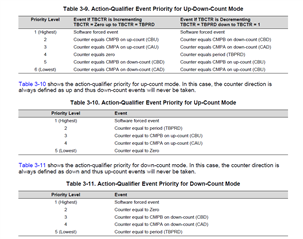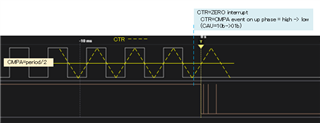Hi experts,
I have a question about AQCTLA register.
When is SW updated value is active on the AQCTLA register ?
For example, our sw update a value on the AQCTLA register and what timing is new values(ZRO, PRD, CAD, CAU, ...) ?
EPwm1Regs.AQCTLA.all= 0x0090U
Is it immediately active ? or CTR=0 or CTR=PRD
Could you please let us know a timing to update active setting on AQ submodule ?
Best regards,
Hidehiko





